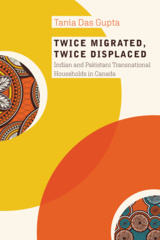
Unmooring the Komagata Maru
Charting Colonial Trajectories
In 1914, the SS Komagata Maru crossed oceans and jurisdictions – Hong Kong, Malaya, Singapore, Japan, and West Bengal – to arrive on the west coast of Canada. Citing regulations designed to limit the immigration of Indians, Canadian officials refused the ship and its passengers entry and detained them for two months in Vancouver Harbour. Most of the 376 passengers were then forcibly returned to India.
Unmooring the Komagata Maru challenges conventional Canadian historical accounts of the incident by drawing from multiple disciplines and fields to consider the international and colonial dimensions within the context of political resistance, migration, cultural memory, and nation-building. Drawing from various disciplines, the collection situates the history of South Asians in Canada within a larger global-imperial history, emphasizing the ways in which the Komagata Maru incident is related to issues of colonialism.
The contributors offer not only nuanced interpretations of the ship’s journey but also a critical reading of Canadian multiculturalism through past events and their commemoration. Ultimately, they caution against narratives that present the ship’s journey as a dark moment in the history of an otherwise redeemed nation. Unmooring the Komagata Maru demonstrates that, more than a hundred years later, the voyage of the Komagata Maru has yet to reach its conclusion.
Scholars and students of postcolonial studies, transnational studies, Canadian studies, South Asian studies, Canadian history, politics, sociology, and critical ethnic studies will find much to interest them in this book. It will also find an audience within the South Asian diaspora.
Awards
- 2020, Commended - Best Edited Collection, Canadian Studies Network
Unmooring is an important transnational text that sheds light on the history of British Columbia and the Pacific Northwest as well as their present.
Overall, this book is a well-written, rich and complex exploration of an event that illuminates Canadian nationalism and racisms and the transnational disciplining of brown bodies across borders, as well as historical anti-imperialist and contemporary anti-racist and anticolonial struggles. As a book that makes a vital contribution to political science and, indeed, the social sciences more broadly, Unmooring the Komagata Maru deserves an important place in university classrooms and research libraries across Canada and beyond.
This book brilliantly disrupts the tendency to write the Komagata Maru into Canadian history in ways that support Canadian multiculturalism and nationalism, and instead places the ship and its passengers within global imperial history.
Rita Kaur Dhamoon is an assistant professor of political science at the University of Victoria. She is author of Identity/Difference Politics: How Difference Is Produced and Why It Matters and has written widely on multiculturalism, critical race theory, feminist and gender politics, and anti-colonial studies. Davina Bhandar is an assistant professor of political science at the Centre for Social Sciences at Athabasca University. She has published in the areas of critical race studies, migration, theories of dispossession, citizenship studies, and the securitization of borders. Renisa Mawani is a professor of sociology and recurrent chair of the Law and Society Program at the University of British Columbia. She is the author of Colonial Proximities: Crossracial Encounters and Juridical Truths in British Columbia, 1871–1921 and Across Oceans of Law: The Komagata Maru and Jurisdiction in the Time of Empire and, with Antoinette Burton, the coeditor of Animalia: An Imperial Bestiary of Our Times. Satwinder Kaur Bains is an associate professor of social, cultural, and media studies at the University of the Fraser Valley in Abbotsford. She has written articles for the Asia-Pacific Journal, Women’s Studies International Forum, Ethnicity and Inequalities in Health and Social Care, and Understanding Sikhism: The Research Journal, and has contributed various book chapters.
Contributors: Suchetana Chattopadhyay, Enakshi Dua, Ian Christopher Fletcher, Ayesha Hameed, Nadia Hasan, Rajender Kaur, Sailaja Krishnamurti, Tariq Malik, Kaori Mizukami, Radhika Mongia, Omme-Salma Rahemtullah, Alia Somani, Irina Spector-Marks, Nayani Thiyagarajah, Nishant Upadhyay
Introduction: Itinerant Subjects of Empire: Unmooring the Komagata Maru / Davina Bhandar and Rita Kaur Dhamoon
Part 1: The Politics of Anti-Colonial Resistance in the Journey of the Komagata Maru
1 Right to the Empire?: British Imperial Citizenship before the First World War / Ian Christopher Fletcher
2 The Last Stretch of the Journey: The Komagata Maru, War-Time Political Radicalism, and Migrant Workers from Punjab in Calcutta / Suchetana Chattopadhyay
3 Resistance Struggles: Facing Lies, Deception, and Racism / Satwinder Kaur Bains
Part 2: Migration Regimes in Colonial Contexts
4 The Komagata Maru as Event: Legal Transformations in Migration Regimes / Radhika Mongia
5 Borders, Boats, and Brown Bodies: Reading Tamil “Irregular Arrivals” through the History of the Komagata Maru / Nadia Hasan, Sailaja Krishnamurti, Omme-Salma Rahemtullah, Nayani Thiyagarajah, and Nishant Upadhyay
6 Temporary Arrivals: The Komagata Maru Passengers and Migrant Labour / Davina Bhandar
Part 3: Colonial Temporalities of Memory and Cultural Production
7 The Komagata Maru Incident as Described in Two Japanese Works / Kaori Mizukami
8 (Mis)Representing the Komagata Maru in Indian Print Cultures / Irina Spector-Marks
9 The Time and Sound of the Nautical Border / Ayesha Hameed
Part 4: Disrupting Colonial Formations of Nation
10 When Home and Harem Collide: The "Hindu Women’s Question": A Mass Spectacle of the Canadian Nation, Family, and Modernity / Enakshi Dua
11 The Komagata Maru Recontextualized: Memory, History, and Diasporic Sikh Subnationalism in Anita Rau Badami’s Can You Hear the Nightbird Call? / Rajender Kaur
12 Past Wrongs and a New National Imaginary: Remembering the Komagata Maru Incident / Alia Somani
13 The Politics of Empire: Minor History on a Global Scale / Renisa Mawani
14 Poems: Still Chanting Denied Shores / Tariq Malik
Appendix 1: Historical Figures cited in the Chapters
Appendix 2: BC Government Apology, May 23, 2008
Appendix 3: Canadian Government Apology, May 18, 2016
List of Contributors; Index










